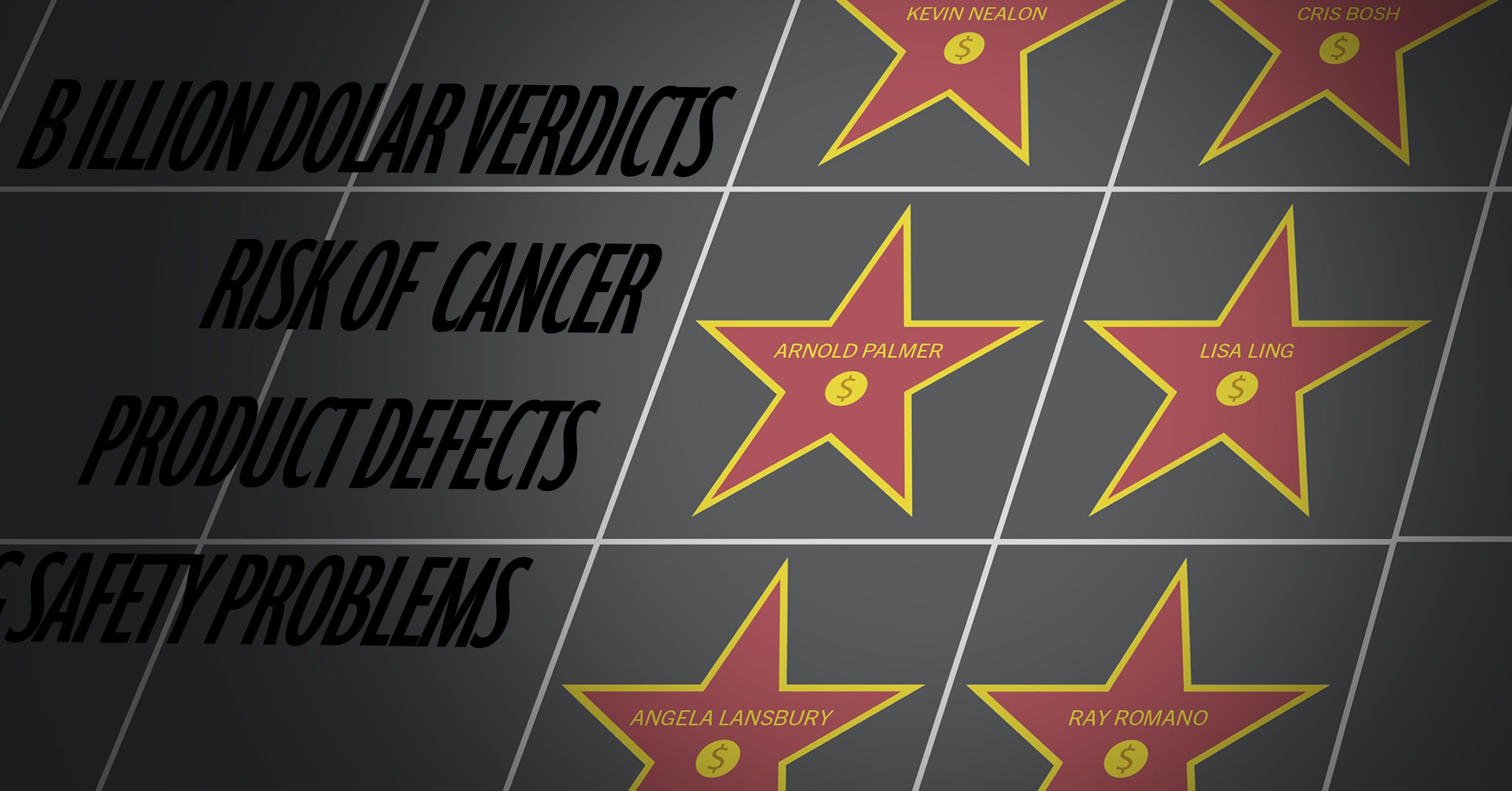Celebrity Luster Overlooks J&J Product Liability Problems

- Celebrities lend their reputations to Johnson & Johnson for cash
- Arnold Palmer, Jennifer Aniston, Chris Bosh, Lisa Ling, Kevin Nealon, Brian Vickers, Angela Lansbury, and more
- Fans pay the price
Golf legend Arnold Palmer, in his signature pink sweater, meets celebrity buddies on the golf course in television commercials for Xarelto, Johnson & Johnson’s new generation blood thinner. In ads that aired over a period of two years, the foursome with NBA player Chris Bosh, comedian Kevin Nealon and NASCAR driver Brian Vickers promote treatment with Xarelto as “the right move for us.”
Nearly 30,000 consumers decided Xarelto was not the right move for them. In lawsuits, they claimed the public wasn’t adequately warned that Xarelto could cause uncontrolled and potentially fatal bleeding.
Just one month before his death in 2016 and two years before an antidote to Xarelto was developed, Palmer had to undergo surgery to stop internal bleeding in his colon, according to Golf Digest. If the colon bleeding episode was linked to Xarelto, it doesn’t appear Palmer ever said so publicly. Those watching the Xarelto lawsuits wonder if there was a connection.
The U.S. Food and Drug Administration (FDA) is investigating the use of celebrity endorsements of pharmaceuticals. The agency is examining the influence of celebrities and how consumers would react if the ads disclosed payments to the celebrities.
“Brand-name pharmaceutical companies use celebrity endorsements because they hope such endorsements will cause patients to blindly pressure their doctor to prescribe the companies’ products, regardless of the merits of using those drugs,” Dr. Michael Carome, the director of nonprofit Public Citizen’s Health Research Group, told Drugwatch.
Johnson & Johnson spends more on marketing than other big-name pharmaceutical firms, according to Drugwatch. Although pharmaceutical companies like to blame the high price of prescriptions drugs on the cost research and development, J&J spends more than twice as much money on marketing as on R&D. In 2013, the company spent $8.2 billion on R&D but $17.5 billion on marketing.
Recent celebrities who have endorsed J&J products or lent their reputations to the company include Friends star Jennifer Aniston who began pitching Aveeno over-the-counter skin care products in 2013.
Before the company’s DePuy hip replacements were hit with thousands of consumer lawsuits and removed from the market, J&J hired actress Angela Lansbury and Chicago Cubs Hall of Fame shortstop Ernie Banks to promote the joint replacements.
“Literally this reached millions of people and it was a very educational message — ‘Don’t wait. Go see an orthopedic surgeon,’” Mindy Tinsley, Group Manager, Communications, DePuy Orthopaedics Inc., told Orthopedics Today in 2007.
The latest celebrity to sign on with Johnson & Johnson is journalist Lisa Ling. Ling fronts a series of infomercials on the company website and YouTube channel about the search for a vaccine for Covid-19. The series coincides with a $456 million federal grant received by the company in March for a “new vaccine asset” for Covid 19.
Johnson & Johnson has leveraged family-friendly stars to boost the image as a good corporate citizen. Starting in 1999, J&J created a series of public service-like ads about caring for children featuring actors Ray Romano and Christopher Reeve, author Toni Morrison and singer/composer Randy Newman.
Another corporate feel-good ad series, J&J’s iconic “Having a baby changes everything” campaign, in 2005 began to feature celebrities talking directly into the camera about how children changed their lives. Actor Stephen Collins from The WB’s 7th Heaven, actress Holly Robinson Peete from UPN’s Love Inc. and writer Nicholas Sparks from publisher Warner Books, were seen in three versions of the ad, according to Adweek.
Published reports indicate that celebrities a decade ago were earning from $20,000 to $2 million just to raise awareness about a particular disease, let alone endorse a specific drug or product, although the public typically was unaware of the payment.
Left unsaid in TV commercials are problems that arise with company products: the hip joints that failed and needed to be replaced a second time. Or, the tens of thousands of people a year who died from Xarelto and similar anti-coagulants before an antidote was found, according to a 2019 article in Georgetown Medical Review.
In the case of Xarelto, the J&J drug and other similar new anticoagulants had become “one of the highest priority drug safety problems in 2016 by several measures” and a leading factor in drug-related emergency room visits, according to QuarterWatch.
The Georgetown Medical Review found that “more than 84,000 patients taking (Xarelto and similar drugs) are hospitalized every year in the United States due to major bleeds. After the bleeding begins, the risk of death or disability can be high.” Xarelto was marketed an alternative to warfarin, a widely prescribed 66-year-old anti-coagulant that was thousands of dollars cheaper than Xarelto and could be quickly reversed with a dose of Vitamin K. By comparison, when an antidote for Xarelto was approved by the FDA in 2018, the price for a single dose ranged from $25,000 to $50,000 per patient, according to the medical review.
J&J is a client of the Amy Doner Group which specializes in finding celebrity endorsers for pharmaceutical companies, according to Doner’s website. Emblazoned across the home page is a quote from Variety.com calling Doner "a modern-day matchmaker for pharmaceutical companies.”
According to Forbes magazine, Palmer earned $3.6 million in prize money as a golfer but an estimated $875 million through endorsements, appearances, licensing and golf course design – a little more than Johnson & Johnson agreed to pay in 2019 to settle 25,000 Xarelto lawsuits.